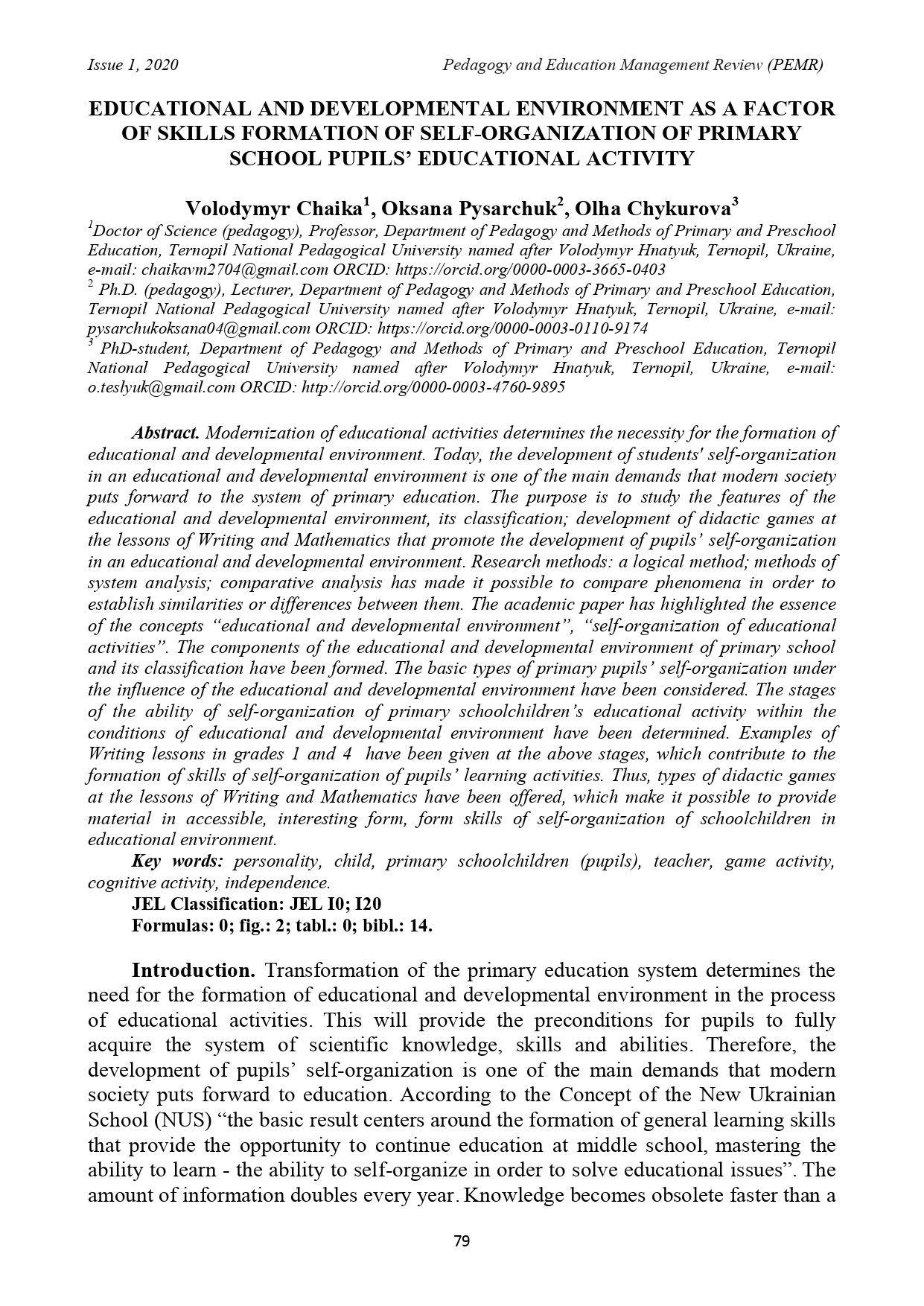EDUCATIONAL AND DEVELOPMENTAL ENVIRONMENT AS A FACTOR OF SKILLS FORMATION OF SELF-ORGANIZATION OF PRIMARY SCHOOL PUPILS’ EDUCATIONAL ACTIVITY
DOI:
https://doi.org/10.36690/2733-2039-2020-1-79Keywords:
personality, child, primary schoolchildren (pupils), teacher, game activity, cognitive activity, independenceAbstract
Modernization of educational activities determines the necessity for the formation of educational and developmental environment. Today, the development of students' self-organization in an educational and developmental environment is one of the main demands that modern society puts forward to the system of primary education. The purpose is to study the features of the educational and developmental environment, its classification; development of didactic games at the lessons of Writing and Mathematics that promote the development of pupils’ self-organization in an educational and developmental environment. Research methods: a logical method; methods of system analysis; comparative analysis has made it possible to compare phenomena in order to establish similarities or differences between them. The academic paper has highlighted the essence of the concepts “educational and developmental environment”, “self-organization of educational activities”. The components of the educational and developmental environment of primary school and its classification have been formed. The basic types of primary pupils’ self-organization under the influence of the educational and developmental environment have been considered. The stages of the ability of self-organization of primary schoolchildren’s educational activity within the conditions of educational and developmental environment have been determined. Examples of Writing lessons in grades 1 and 4 have been given at the above stages, which contribute to the formation of skills of self-organization of pupils’ learning activities. Thus, types of didactic games at the lessons of Writing and Mathematics have been offered, which make it possible to provide material in accessible, interesting form, form skills of self-organization of schoolchildren in educational environment.
Downloads
References
Zhuravlyova, L.S. (2018). The problem of organizing independent activities of students in primary school: socio-pedagogical aspect. International scientific conference, Kaunas, Lithuania, 23-26.
Kichuk, N.V. (2016). Creating an educational environment for primary school students is a personal and professional purpose of a modern school teacher. Proceedings. Series: pedagogy,1, 6-10.
Kostyuk, I. (2016). Formation of educational and developmental environment in the lessons of literary reading in primary school. Pedagogical sciences: theory, history, innovative technologies, 5 (59), 314-323.
Menkova, S.A. (2019). Formation of bases of self-organization at pupils of elementary school in educational activity. Scientific research: first steps: materials of the 73rd review of student research papers of the Department of Pedagogical, Social and Special Education. Irkutsk, (March 25-April 5).
The concept of the New Ukrainian school. (2016). URL: https://mon.gov.ua/storage/app/media/zagalna%20serednya/nova-ukrainska-shkola-compressed.pdf (access date: 10.10.2020).
Pisarchuk, O.T. (2016). Preparation of the future primary school teacher for the organization of the educational and developmental environment: (Doctoral dissertation). Retrieved from Proquest Dissertations and Theses, Ternopil.
Pisarchuk, O.T. (2012). Features of the formation of the educational and developmental environment of preschool educational institutions. Scientific notes of Ternopil National Pedagogical University, 2, 44-51.
Rachenko, I.P. (1972). Scientific organization of pedagogical work. Moscow: Pedagogy.
Savchenko, O.Ya. (2012). Learning environment as a factor stimulating research activities of junior schoolchildren. Scientific notes of the Small Academy of Sciences of Ukraine, 1, 41-49.
Sergeenkova, O.P., Stolyarchuk, O.A., Kokhanova, O.P. & Pasek, O.V. (2012). Age psychology: a textbook. Kyiv: LLC «Center for Educational Literature».
Smolyuk, S.V. (2017). Organizational and pedagogical conditions of formation of the developmental educational environment in the system of primary education of Ukraine (the end of the XX - the beginning of the XXI century). (Doctoral dissertation). Retrieved from Proquest Dissertations and Theses, Lutsk.
Smolyuk, S.V. (2016). Formation of the developmental educational environment of primary school in Ukraine in the XXI century: socio-cultural discourse. Pedagogical magazine of Volyn, 1 (2), 26-30.
Faleeva, L.V. (2012). Organization and self-organization as a personality trait: a comparative analysis of concepts. Modern problems of science and education, 4, 266-274.
Shevchenko, K.O. (2014). Pedagogical facilitation in the context of professional competence of a teacher. Scientific Bulletin of Mykolayiv National University named after V.O. Sukhomlynsky, 2 (13), 258-263.
Yasvin, V.A. (2001). Educational environment: from modeling to design. Moscow: Smysl.

Additional Files
Published
How to Cite
Issue
Section
License
Copyright (c) 2022 “Scientific Center of Innovative Researches” OÜ

This work is licensed under a Creative Commons Attribution-NonCommercial-NoDerivatives 4.0 International License.





